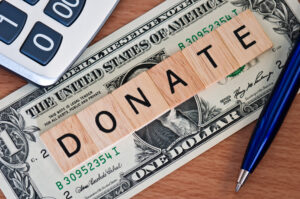How much can you claim in charitable donations without receipts?
Charitable donations are usually given from the bottom of your heart—but you may be wondering about the potential tax benefit of your donation too. But, many people wonder “What donations can I claim without receipts?” We’ll outline how charitable donations could offset your taxable income.
Rules for charitable donations: When do you need a donation tax receipt?

Can you claim a tax deduction for a charitable donation without a donation tax receipt? In some cases, you can still take the charitable donation deduction without a donation receipt. However, there are certain property or cash donation requirements, which vary by the amount and type of charitable contribution. In order to claim them, you need to need to understand the specifics. Let’s outline some key points:
Cash donations to charitable organizations:
All cash, or cash equivalent, donations can only be deducted if you keep certain records. Record requirements for cash charitable donations depend on the value of the charitable donation.
- Under $250: A cash donation under $250 to a qualified charitable organization (not any small business) is one of the few charitable donations without receipt that’s allowable by the IRS. You can qualify for taking the charitable donation deduction without a receipt; however, you should provide a bank record (like a bank statement, credit card statement, or canceled check) or a payroll deduction record to claim the tax deduction. There is a small exception for cash donations made to an unmanned location, such as a donation tin.
- Over $250: Cash donations of $250 or more require a receipt from the charitable organization or certain payroll deduction records. The receipt, also called a contemporaneous written acknowledgment must be in writing and include:
- The amount of your cash contribution
- Whether or not the organization provided any goods or services in exchange for the donation
- Description and good faith estimate of the value of goods or services, if any, that the organization provided in return for the contribution
- The date of your cash contribution
If the receipt doesn’t include a date, then the donor must keep a bank record showing the date of the cash contribution.
Non-cash charitable donations:
Similar to cash donations, record requirements depend on the value of the gift.
- Under $250: You’ll need a receipt for non-cash donations under $250 in value unless the items were dropped off at an unmanned location, such as a drop-off bin.
- $250 to $500: Non-cash donations of $250 to $500 in value require a contemporaneous written acknowledgment of your donation. (Scroll back up to view the full definition if you skimmed past it.) When claiming the deduction, include the qualified organization’s name, address, date, donation location, and description of property donated.
- $500 to $5,000: A non-cash donation over $500 in value will also require a written acknowledgment of your donation and a record of how and when the items were acquired and their adjusted basis.
- Over $5,000: If the donation’s value exceeds $5,000, the IRS requires an appraisal from a qualified appraiser as well as the written acknowledgment of your donation.
The Internal Revenue Service (IRS) considers each charitable donation separately. It doesn’t matter whether the donation reaches the $250 limit—even if the contributions benefit one charitable organization.
File with H&R Block to get your max refund
Which organizations are considered qualified charitable organizations?
You can’t just write off any expense; the IRS has some guidelines around what groups qualify for tax-deductible donations. You can only deduct contributions made to qualified organizations. To be a qualified organization, most organizations must apply to the IRS for this status.
Examples of organizations that can accept tax-deductible donations include:
- Churches, mosques, synagogues, temples, and other religious organizations
- Charity groups
- 501(c)(3) organizations
- Nonprofit schools
- Nonprofit hospitals
- Volunteer fire departments
- Veterans’ and certain cultural groups
- Public parks and recreation facilities
If you’re unsure of an organization’s charitable status, contact them directly or use the IRS Exempt Organizations Lookup Tool.
Is there a tax donation form for charitable items?
Charitable donations are reported on Schedule A. Cash donations are reported on line 11 and non-cash donations are reported on line 12 of Schedule A.
Taxpayers who donated more than $500 in noncash property to charitable organizations may wonder if there is a specific tax donation form to use when preparing your tax return. If your deduction for all noncash donations is more than $500, read on to hear what form to use and how to fill it out.
How to claim a charitable contribution deduction using Form 8283
You’ll use IRS Tax Form 8283 to report information about tax-deductible donations of non-cash items when the donated amount exceeds $500.
To claim a tax-deductible donation, itemize your deductions rather than using the standard deduction. (But, if your standard deduction is more than itemized deductions, you should skip itemizing your return and take the standard deduction instead. In this event, you wouldn’t need to fill out the 8283 form.
When completing Form 8283, you will need to provide information about the donated property, including its description, fair market value, and how you acquired it. Additionally, the charitable organization receiving the donation must provide acknowledgment of the donation on Part IV of the form.
Learn more about taking the itemized vs. standard deduction.
Get help with filing Form 8283 and claiming charitable contributions
Need more guidance on tax reporting for charitable giving or filing Form 8283 this tax year or are you still questioning, “Can I claim charitable donations without a receipt?” Whether you make an appointment with one of our knowledgeable tax pros or choose one of our online tax filing products, you can count on H&R Block.
And if you’re a small business looking to claim charitable contributions, head to Block Advisors.
Was this topic helpful?
